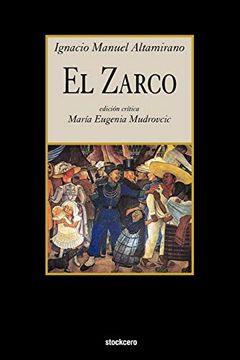Compartir
El Zarco
Ignacio Manuel Altamirano (Autor)
·
Stockcero
· Tapa Blanda
El Zarco - Ignacio Manuel Altamirano
S/ 109,34
S/ 218,67
Ahorras: S/ 109,34
Elige la lista en la que quieres agregar tu producto o crea una nueva lista
✓ Producto agregado correctamente a la lista de deseos.
Ir a Mis Listas
Origen: España
(Costos de importación incluídos en el precio)
Se enviará desde nuestra bodega entre el
Jueves 16 de Mayo y el
Lunes 27 de Mayo.
Lo recibirás en cualquier lugar de Perú entre 2 y 5 días hábiles luego del envío.
Reseña del libro "El Zarco"
El Zarco by Ignacio Atamirano in a US printed edition with preliminary study and notes by Maria Eugenia Mudrovcic Ignacio Manuel Altamirano's posthumous novel, El Zarco (1901), is much more than a novel about bandits. Written amidst the «pax porfiriana», at the height of Altamirano's reputation within the cultural elite, the novel is a narrative that deals with the chaos and the banditry that prevailed in the 1860s to celebrate the insertion of Mexico into the international markets undertaken by Porfirio Díaz. Considered to be «the first Mexican novel» because of its carefully constructed structure, El Zarco is also "original" in its approach to race: green-eyed white characters are the villains, while the heroes are Indian or mestizos. What makes a heroe, however, is not a matter of race, but the strict adherence to honor, family and hard work, the «civil» values guiding the actions and the ethos of each and every good citizen or "hombre de bien" of Yautepec. The nineteenth century bourgeois obsession with "crime" emerges in El Zarco as the matrix of the two stories that end up being one: "crime" is the cause for the fear and «insecurity» that paralyze Yautepec middle classes as well as the reason for the glorification of the rural police. Altamirano presents the «good love» between Nicolas and Pilar as a counternarrative of the sexually undisciplined story of lust enacted by Manuela and el Zarco. But this narrative line seems to be, nonetheless, only a frame to celebrate Sanchez Chagollan as the heroic founding father of the police created by Benito Juárez in 1861 that later became an icon of the institutional order of the Diaz regime. In the study that introduces this edition, Maria Eugenia Mudrovcic reads the «unorthodoxies» of Altamirano's novel as part of the propaganda apparatus set by Porfirio Diaz in his effort to change the image of Mexico as a «bandit nation» that dominated the press at the time. Why Altamirano talks of «violence» in «times of peace», thus, becomes the starting-point for a reading of El Zarco that pays attention not so much to bandits but rather to the police that was created as the only way to combat them.
- 0% (0)
- 0% (0)
- 0% (0)
- 0% (0)
- 0% (0)
Respuesta:
Todos los libros de nuestro catálogo son Originales.
Respuesta:
El libro está escrito en Español.
Respuesta:
La encuadernación de esta edición es Tapa Blanda.
✓ Producto agregado correctamente al carro, Ir a Pagar.

